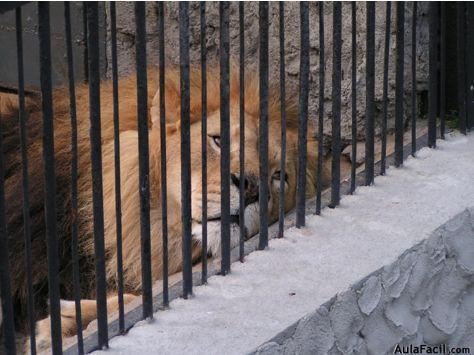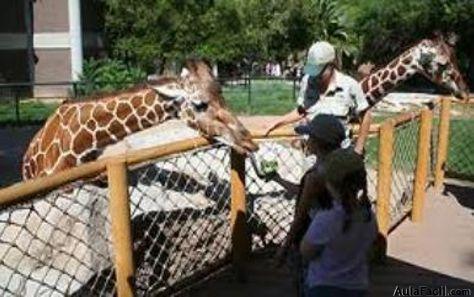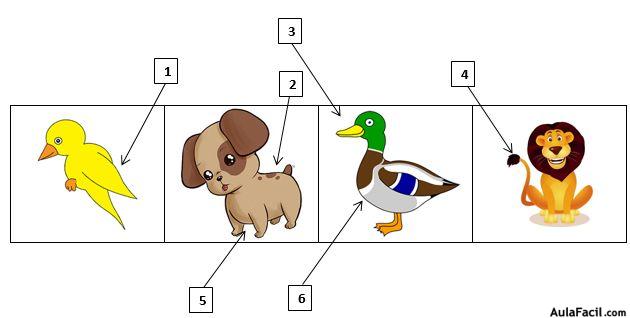Animals
Speaking
Part 3
Below are two pictures. What can you see in each picture?


- Where are the pictures taken?
- Do you often go to these places?
The pictures show animals in a zoo. Now I’d like you to talk about what you think of zoos.
Prompts
- Talk about the last time you went to a zoo.
- Talk about what you saw at the zoo.
- Talk about what you think of zoos. Are they a good way to see lots of different animals? Or they unfair to the animals?
- Tell us why you think zoos are so popular.
Reading
Read the text below and choose the correct word for each space.
Choose A, B, C or D.
| Monkey World | ||
| Monkey world is an ape rescue centre (1) Dorset, England. The rescue centre has 65 acres of land (2) homes approximately 250 primates. It was set up in 1987 (3) Jim Cronin. | ||
| The centre works with governments all (4) the world to help them fight against smuggling primates from the wild. So far, the centre has (5) primates from Spain, Greece, France, Austria and many more. In most countries, these animals were being used in laboratories, as circus animals or as photographer’s props. | ||
| Chimpanzees are born in Africa and if they are taken from (6) families when they are young, it is common for their brothers and sisters to die. The centre wants to make people aware of the dangers of taking these animals and (7) keeping them illegally as pets. | ||
| To make money for the centre, Monkey World used to have (8) own TV programme every week and it showed the lives of a number of the primates. People around the world became (9) with Charlie, Paddy and Sally and daily life in the park. (10) the programmed stopped two years ago, the park has received heavy donations from donators worldwide. The park also (11) people to adopt the primates and pay a certain quantity of money to them per month. | ||
| The centre is open every day, (12) Christmas day, from 10:00 – 17:00 and in July and August from 10:00-18:00. | ||
Corregir
Ver Solución
Limpiar | ||




Vocabulary – Animals
A. Name the animals.
| 1) |  | |
| 2) |  | |
| 3) |  | |
| 4) |  | |
| 5) |  | |
| 6) |  | |
| 7) |  | |
| 8) |  | |
Corregir
Ver Solución
Limpiar | ||
A. Label the parts of the animal.

| 1) | ||
| 2) | ||
| 3) | ||
| 4) | ||
| 5) | ||
| 6) | ||
Corregir
Ver Solución
Limpiar | ||
B. Which animals have:
| 1) | Fins? | |
| 2) | Hoofs? | |
| 3) | Hair? | |
| 4) | Claws? | |
| 5) | Thumbs? | |
Corregir
Ver Solución
Limpiar | ||
Grammar – Conditionals (ii)
Second Conditional
Form:

Use:
Utilizamos esta forma para las situaciones imaginarias, que creemos que son casi imposibles de realizar.
- If I won the lottery, I would buy a house.
- I would buy a car if I won the lottery.
Normalmente usamos ‘were’ en vez de ‘was’ después de If I/he/she/it:
- If I were you I would….
- If you were old enough….
A. Complete the gap with the correct form of the verb in brackets.
| 1) | I (go) on holiday if I had the money. | |
| 2) | She would adopt a chimpanzee if she (can). | |
| 3) | If I (not/have) an exam this weekend, I would go to the party. | |
| 4) | If they weren’t allergic to fur, they (buy) a dog. | |
Corregir
Ver Solución
Limpiar | ||
B. Identify the conditional
1. Zero conditional
2. First conditional
3. Second conditional
| 1) | If we were rich, we would buy a house by the seaside. | |
| 2) | If she eats chocolate, she gets a headache. | |
| 3) | If Monkey World raises enough money, they will adopt more primates. | |
Corregir
Ver Solución
Limpiar | ||
C. Complete the gaps with the correct form of the verb.
| 1) | If I had a lot of money I (buy) a fast car. | |
| 2) | If he calls me again I (not help) him. | |
| 3) | Children would be fitter if they (ride) their bikes to school. | |
| 4) | When Jane is upset she (start) shouting at people. | |
| 5) | Alex would be very upset if he (know) the results of the match. | |
| 6) | If you don’t like it, (not eat) it. | |
Corregir
Ver Solución
Limpiar | ||
Listening
You will hear a radio interview with Mike, a dog trainer.
For each question, choose A, B or C.
| Sonido |
| ||
Corregir
Ver Solución
Limpiar | ||
Writing
You want to invite your English friend Sarah to the zoo next Saturday.
Write Sarah an email. In your email, you should
- Invite her to the zoo
- Tell her what you want to see at the zoo
- Suggest a place to meet
Write 35-40 words.
Recording
Presenter: Welcome to pet hour, where we talk for a whole hour about pets. With us today, we have Mike who is a dog trainer. Welcome Mike!
Mike: Thank you Tara. It’s a pleasure to be here.
Presenter: So, a dog trainer is a very specific job. When did you decide you wanted to become one?
Mike: That’s an interesting question. You see, I’ve always loved pets. Since I was 4, there have always been dogs and cats in the family. Then when I was 17, my parents bought a new puppy and she was really badly behaved. She used to scratch all the furniture, eat our socks and she ate everything in the house. My mum thought she had an illness, but she just had a lot of energy!
Presenter: I bet your parents loved that!
Mike: Not exactly. They were so angry with her all the time that she never really learned. She had a lot of energy and she needed to be treated carefully. That’s when I decided that I would train her.
Presenter: And did you?
Mike: It took me 3 months but at the end of it she had totally changed. She was more friendly, more relaxed and although she was always hungry, she stopped eating everything in the house.
Presenter: Was it then that you knew that you were capable of training dogs?
Mike: From training our dog, I realised that dogs and humans are very similar. You need to respect them and they will respect you. It takes time and patience, but it’s worth it in the end.
Presenter: From this moment did you start your dog training classes?
Mike: No. I went to university to study animal psychology and it taught me a lot about what different animals are like and why they behave in different ways.
Presenter: That sounds really interesting.
Mike: It is. Anyway, when I finished the course, I started my own dog school with classes for dogs of all ages. All dogs are very similar in that they need to be educated. It’s like school. You can’t expect your dog to know everything unless you teach him or her.
Presenter: I guess this is what influenced your book?
Mike: That’s correct. Dog owners need to know that dogs don’t know right or wrong. The dog owners need to teach them.

